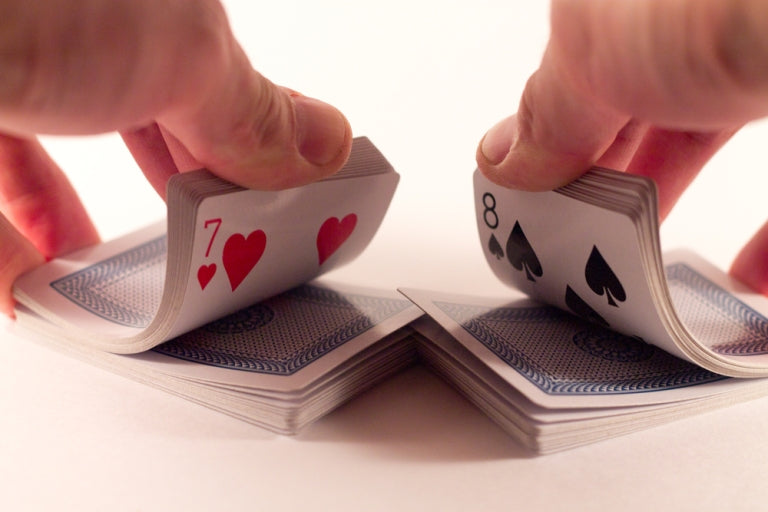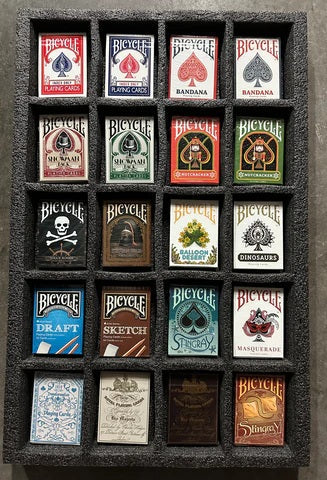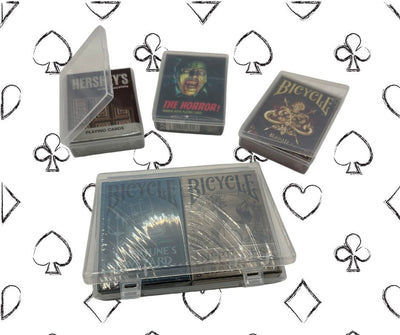
We have all shared that insecure feeling that comes when the dealer position rotates to you during a card game amongst friends. The people in the circle haphazardly push their cards your way and turn to each other to discuss their various levels of luck in the preceding round. While most of the cards are faced down, a few Kings stare at you, demanding to see your shuffling skills. You do your best to mold the angular blob back into a stacked rectangle by pushing in on all sides. Eventually you get what resembles a deck, turning over any rebellious cards so that everything is facing one way. Then comes the shuffle…
You break the deck in two, place the piles on the table, press your thumb against the bottom card, and successfully flip through the two piles independently without any cards merging with the other pile. A fellow player gives you a look and then continues with their conversation. You try again. This time, sporadic chunks of cards manage to swap piles. You beak the deck again and continue until bad shuffle after bad shuffle, the cards eventually get randomized.
While this might be acceptable at casual games with friends, certain games like Poker or even Solitaire require a strong shuffle every time in order for the play to be fair. Here are some quick guides to a few shuffling techniques.
If you are looking for cards to shuffle with, check out a standard deck here or one of our more recent arrivals here.
The Overhand
The overhand is a classic beginner shuffle that requires little hand coordination. To do an overhand shuffle, have the deck faced down in your non-dominant hand. Then, use your dominant hand to select various sized chunks of cards to be placed at the top of the deck. Do this rapidly for about 10 seconds or until you feel like the deck is shuffled enough.
While the overhand might not be the most effective way to shuffle a deck of cards, it is certainly the easiest way and can still get the job done after a few seconds. This method is favored by some magicians because it can give the illusion of an effective shuffle while they are actually performing sleight of hand and controlling particular cards.
The Riffle
The riffle shuffle is a much more professional version of the shuffle described at the beginning of the article. To perform the riffle, you must cut the deck into equal halves, one for each hand. For both decks, hold the back short edge with your pinky, ring and middle fingers. Use the knuckle of your pointer fingers to press on the back of the decks while your thumb flips through the other short edge. Do this so that the decks become intertwined for about an inch. Next, place your thumbs on the space where the cards are intertwined and place the rest of your fingers underneath the deck. Simultaneously push down on your thumbs and push up with your other fingers to create an arch with the two decks. Finally allow the cards to fall into place to create a shuffled deck of cards.
This shuffle is more effective than the overhand and looks a lot cooler too!
The Faro
The faro shuffle should not be confused with the game Faro. The faro shuffle is known as the perfect shuffle because if it is done properly, all 52 cards are evenly intertwined. To perform a faro shuffle, you need to cut the deck perfectly even with two piles of 26 cards. This largely is done through muscle memory. If you are unsure if the decks are even, you can place them next to each other and transfer cards as needed. Once you have your two decks in your hands, face them down and make sure they are both evenly aligned. You can do this by taping them against a table or themselves. Put your non-dominant pointer finger underneath the deck it is holding and your dominant pointer finger above its deck. Bring the two short edges together, move your non-dominant pointer finger to the other short edge and use it to push the two decks together. After the two decks are intertwined for about an inch, put your dominant thumb on one short edge and your dominant pointer and middle fingers on the other short edge and pinch the two decks together, allowing them to fall into place.
Note: If your deck was traditionally made, meaning that the deck was cut face down in production, it will be easier to intertwine the cards from the bottom up. If your deck was not traditionally made, meaning that the deck was cut face up in production, it will be easier to intertwine the cards from the top down. As you break in a deck however, it will get easier and easier to do the faro both ways.
The Grandma
Nobody should be ashamed for doing a grandma shuffle. A grandma shuffle can be surprisingly effective, even if it does look unprofessional. To do a grandma shuffle, spread out all of the cards face down on a table. Use both of your hands to wash or rotate the cards around until you feel that enough cards have been mixed up. Then, slowly assemble the cards back into a deck.
For a more comprehensive list, check out this shuffling article here.
About the author: John Taylor is a content writer and freelancer through the company Upwork.com. You may view his freelancing profile here. He has a B. A. in English, with a specialty in technical writing, from Texas A&M University and a M. A. in English from the University of Glasgow. You may view his previous articles about card games here and his LinkedIn profile here.





